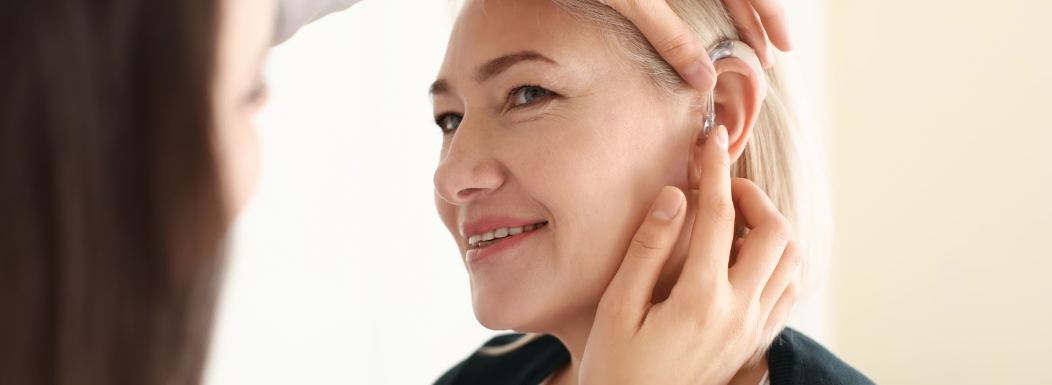For many of us, the gift of hearing is often taken for granted. We know that we’ll hear our alarm clock in the morning and we know that it’s raining outside when we hear the drops on the window. However, for others, these everyday moments don’t always come naturally.
Not only does healthy hearing help us to function in daily life, but it also helps us to quickly connect with others; to tune into our companion as they talk in a busy restaurant and to hear signs of danger, such as a car speeding around the corner or the ringing of a fire alarm.
Hearing loss affects around one in six people across the UK, but there is more than one reason it happens. Before we look at the common causes of hearing loss, it’s helpful to first understand how hearing loss occurs.
Your ear has three major parts — the outer ear, the middle ear and the inner ear. Each of these plays its own part in the process of sending signals to your brain, which then turn into sound. However, the ear is extremely sensitive, so damage or changes to these parts of the ear can result in hearing loss.
Below, we take a look at five common reasons for hearing loss, as well as how to fix these problems.
-
Ageing
Presbycusis is a type of hearing loss that occurs gradually as you age, either due to wear and tear to the tiny hair cells in the inner ear or from complex changes along the nerve pathways that lead to the brain. This condition often occurs in both ears, affecting them equally, and because the loss happens over time, those who have it may not realise that their hearing is degrading.
Strategies to help people with presbycusis may include hearing aids and assistive listening devices to provide further hearing improvement in certain situations.
-
Chronic Loud Noises
Chronic exposure to loud noises is the second biggest cause of hearing loss after age-related damage to the inner ear. If your hearing loss is caused by exposure to noise, you may not be able to hear higher pitches as well as normal due to a dip in your hearing in high frequencies. This is more common for some occupations and activities, such as construction work, lawnmowing and DJing, and it can also be caused by extremely loud bursts of sound such as gunshots and explosions, which can lead to damage within the ear.
Earplugs or special fluid-filled ear muffs should be worn for protection and to prevent any further damage. Hearing aids may also be beneficial, as they could improve your hearing in a variety of everyday situations as well as help make conversations easier and reduce your awareness of tinnitus.
-
Excessive Earwax
The gradual buildup of earwax can block the ear canal, which can prevent sound from entering the inner ear and later cause hearing loss. Furthermore, excessive earwax can also lead to tinnitus, dizziness and general discomfort due to pressure on the eardrum and repeat ear infections.
If the excess earwax is left untreated, your hearing can continue to decline, so it’s important to get it removed as soon as possible. A professional earwax removal service is the best method to do this, either through instrumentation (the wax is picked out using disposable tools), syringing (a stream of warm water flushes the wax out) or microsuction (wax is vacuumed from the ear using a small suction device). An audiologist can suggest the best technique for your personal situation.
-
Ototoxic Medications
Some prescription and over-the-counter drugs can cause damage to the inner ear, resulting in hearing loss, balance problems and tinnitus. These are known as ototoxic, and today, there are more than 100 prescription and over-the-counter varieties that are linked with ototoxicity.
However, there is usually only a risk to your hearing when these ototoxic drugs are taken in large doses or when extremely strong drugs need to be used, for example, to treat cancer. If you’re on such medication and experience hearing loss, balance problems or tinnitus, there could be a link here, but it’s recommended that you see your doctor to discuss this further.
-
Ménière’s Disease
Ménière’s disease is a condition of the inner ear that causes sudden attacks of hearing loss, as well as tinnitus, ear pressure deep inside the ear and vertigo. This condition commonly starts in one ear but usually spreads to both ears over time.
The exact cause of Ménière’s disease is unknown, but it’s associated with a problem with pressure deep inside the ear and different factors can be explored. There is no cure, unfortunately, but prescribed medication can help you control the symptoms of vertigo, nausea and vomiting.
If you’ve recently noticed problems with your hearing, the above may give you a rough idea of the reason why, but make sure to visit your GP for a proper diagnosis.
Photo Credit: Shutterstock

Leave a Reply